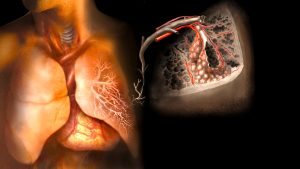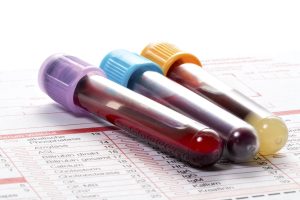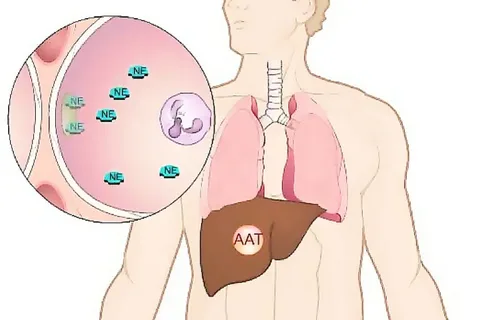What is AAT Deficiency?
Alpha-1 antitrypsin (AAT) deficiency is a hereditary condition that predisposes individuals to severe lung and liver diseases. This genetic anomaly is passed down from parents, and its onset typically occurs between the ages of 20 and 50.
Symptoms of AAT Deficiency
Common signs and symptoms of AAT deficiency include:
- Wheezing or whistling sounds during breathing
- Frequent respiratory infections
- Persistent fatigue
- Rapid heartbeat upon standing
- Unexplained weight loss
- Yellowing of the skin or eyes (jaundice)
- Swollen belly or legs
- Coughing up blood
Newborns with AAT deficiency may exhibit:
- Jaundice
- Bright yellow urine
- Difficulty gaining weight
- Enlarged liver
- Bleeding from the nose or umbilical stump
- Pale, foul-smelling stool
- Low energy levels
In rare cases, individuals may develop a skin disease known as panniculitis, characterized by inflammation of the fat layer beneath the skin, resulting in painful lumps or patches.

How Alpha-1 Affects Your Liver
AAT deficiency impacts liver function as the defective AAT protein accumulates, leading to cirrhosis, severe damage, scarring, and the potential development of liver cancer. The misshaped proteins become trapped in the liver, compromising lung protection and contributing to liver-related complications.
AAT Testing
Diagnosing AAT deficiency involves a series of tests:
- Clinical Examination: Doctors listen for wheezing or other signs of compromised lung function.
- Blood Tests: Measure AAT levels and assess liver function.
- Genetic Testing: Identifies abnormal genes linked to AAT deficiency.
- Imaging: X-rays and CT scans reveal lung damage severity.
- Pulmonary Function Tests: Evaluate lung function by measuring airflow.

Alpha-1 Antitrypsin Deficiency Treatment
While there is no cure for AAT deficiency, treatment options aim to mitigate lung damage and manage symptoms:
- Augmentation Therapy: Weekly IV infusions of AAT protein from healthy donors to slow lung damage.
- Bronchodilators: Medications to open airways, administered through inhalers.
- Oxygen Therapy: Supplemental oxygen through a mask or nosepiece if oxygen levels are low.
- Pulmonary Rehabilitation: Comprehensive programs including breathing techniques, exercises, and education.
Why Get Tested for Alpha-1?
Early detection through testing is crucial to:
- Delay or prevent lung disease progression
- Understand genetic risks for family members
Adopting a healthy lifestyle, including a balanced diet, regular exercise, and refraining from smoking, contributes to overall lung health.
Your Care Team for AAT Deficiency
A multidisciplinary healthcare team is essential for comprehensive care:
- Pediatrician: Overseeing general health, especially in children with AAT deficiency.
- Geneticist: Conducting genetic testing and collaborating on a personalized healthcare plan.
- Pulmonologist: Diagnosing and treating lung-related illnesses.
- Gastroenterologist: Focusing on liver-related complications.
- Pulmonary Rehab Team: Comprising various specialists for holistic rehabilitation.
What to Expect With AAT Deficiency
The disease’s impact varies, with some individuals experiencing severe problems, while others may have few or no symptoms. Possible outcomes include:
- Breathing issues, especially in response to smoke, dust, and allergens.
- Development of Chronic Obstructive Pulmonary Disease (COPD).
- Liver complications affecting 30% to 40% of individuals with AAT deficiency.
Despite potential health challenges, individuals receiving proper treatment can often maintain an active lifestyle.
Treating Liver Problems
For those experiencing liver issues, treatments may include:
- Vitamin Supplements
- Medications for Itching or Jaundice
- Interventions for Bleeding and Fluid Retention
- Liver Transplant in Severe Cases

How Your AAT Deficiency Might Change Over Time
Disease progression varies, impacting organs differently. Factors influencing the medical outlook include:
- Timely diagnosis
- Type of Alpha-1 variant
- Disease impact on the individual
- Extent of organ damage
- Rate of progression
- Smoking habits
Adhering to medical guidance is essential for managing the condition effectively.
Tips for Living With AAT Deficiency
Adopting good habits is crucial for maintaining health:
- Avoid lung irritants like smoke, dust, and pet hair.
- Practice infection control by frequent handwashing.
- Monitor symptoms and pace activities accordingly.
- Adhere to prescribed medications.
- Stay up to date on vaccinations.
- Seek advice on safe exercise practices.
- Limit alcohol consumption.
- Refrain from smoking or seek assistance to quit.

Caring for Your Emotional and Mental Health
Living with AAT deficiency may impact emotional health, leading to feelings of anxiety and depression. Strategies for emotional well-being include:
- Communicating feelings with the healthcare provider.
- Seeking counseling or therapy if needed.
- Maintaining overall physical health through sleep, diet, and exercise.
- Managing stress through various techniques.
- Connecting with support groups for shared experiences.
The Future of Treatment
Researchers are exploring innovative treatments beyond augmentation therapy:
- Recombinant AAT (rAAT): A potential source of AAT created through recombinant technology.
- Inhaled AAT: Studies suggest delivering AAT directly to the lungs via an inhaler may enhance efficacy.
- Gene Therapy: Replacing faulty genes responsible for AAT deficiency.
- Stem Cell Therapy: Replacing damaged cells with healthy stem cells.
- Small Molecule Therapy: Targeting specific molecules to slow liver damage.
These advancements offer hope for enhanced convenience and effectiveness in managing AAT deficiency in the future.

Conclusion
In conclusion, Alpha-1 antitrypsin (AAT) deficiency poses significant challenges as a genetic condition leading to serious lung and liver diseases. Understanding its intricacies is crucial for individuals and their healthcare teams.
The range of symptoms, from wheezing and fatigue to liver-related complications, underscores the diverse impact of AAT deficiency on health. Timely testing is paramount for early detection, enabling the implementation of proactive measures to delay or prevent disease progression and understanding potential genetic risks for family members.
The multidisciplinary care approach, involving pediatricians, geneticists, pulmonologists, gastroenterologists, and pulmonary rehab teams, emphasizes the need for a comprehensive strategy in managing Treatment for other health problems Collaborative efforts and genetic testing contribute to personalized healthcare plans, offering a holistic approach to treatment.
While there is no cure for current treatment options, including augmentation therapy and pulmonary rehabilitation, aim to slow lung damage and enhance overall well-being. Adopting a healthy lifestyle and adhering to prescribed medications play pivotal roles in managing symptoms effectively.




